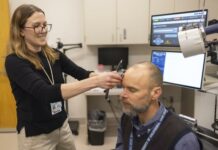Microbes that live in and on us
Sacramento, Calif.- The human microbiome is defined as bacteria, archaea, viruses, and eukearyotic microbes that live both in and on our bodies, with trillions of bacteria residing in the gut.
In fact there are more bacterial cells (40 trillion) in the body than human cells (30 trillion). While some bacteria are associated with certain diseases, many have important metabolic functions in the body and influence the host’s health through various mechanisms such as regulation of the immune system, assimilation of nutrients, production of short chain fatty acids (SCFAs), and protection against pathogens, among many other mechanisms that are continually being discovered today.
So far, the gut microbiome has been shown to play a role in weight, cardiovascular health, inflammatory bowel diseases (IBD), mental health, cancer, autoimmune disorders, and now possibly in aging and brain health.

According to a new research study, published in August 2021 of Nature Aging, the researchers were able to show reversal of the effects of aging on learning, memory, and immunity in old mice after a fecal microbiota transplant.
In the study, the researchers took microbiome from young mice (3-4 months old) and transplanted them into older mice (19-20 month old), after which the older mice were able to find a hidden platform faster in a maze. In addition, they showed that the hippocampus were more like that of young mice after the microbiota transplant. Although this was not a clinical study and we are not sure if these findings can be translated to humans, it opens the doorway for future studies to look at this association deeper and reminds us of the importance of our gut microbiome to our overall health.
So now that we know about the importance of our gut microbiome, what can we do to improve our gut microbiome?
Here are some things you could do.
- Eat a diverse range of foods.
- Eat fermented foods
- Limit your intake of artificial sweeteners
- Eat prebiotic foods
- Eat whole grains
- Eat foods rich in polyphenols
- Take antibiotics only when necessary
- Breastfeed for at least 6 months
References:
- Boehme, Marcus, et al (Aug 2021). Microbiota from young mice counteracts selective age-associated behavioral deficits. Nature. https://www.nature.com/articles/s43587-021-00093-9
- Brody, Herb (Jan 2020). The gut microbiome. Nature. https://www.nature.com/articles/d41586-020-00194-2
- Colino, Stacey (Sep 2021). Fecal Transplants: a New Treatment for IBD. Time. https://time.com/6096395/fecal-transplants/
- Cryan, John (Aug 2021). Scientists Reversed Aging in Mouse Brains With Poo Transplants From Young Mice. Science Alert. https://www.sciencealert.com/scientists-rewound-ageing-in-mice-by-changing-their-gut-bacteria?fbclid=IwAR2mZ7sB618-gJmVvli0iiz9iNt1f-e-gQzttddmrylkD1AspFmfirHWBso
- Robertson, Ruairi (Jun 2017). Why the Gut Microbiome is Crucial For Your Health. Healthline. https://www.healthline.com/nutrition/gut-microbiome-and-health#TOC_TITLE_HDR_2
- Shreiner, Andrew, et al (Jan 2016). The gut microbiome in health and in disease. Current Opinion in Gastroenterology. https://www.ncbi.nlm.nih.gov/pmc/articles/PMC4290017/
Written by Namuun Bat, ND at Sacramento Naturopathic Center. SAC-ND.com , Facebook or Sacramento Office (916) 446-2591.
Explore additional topics at Natural Wellness.
(21+ years strong)
Welcome to the brighter side!
Get in front of local customers! 24/7 (365)























